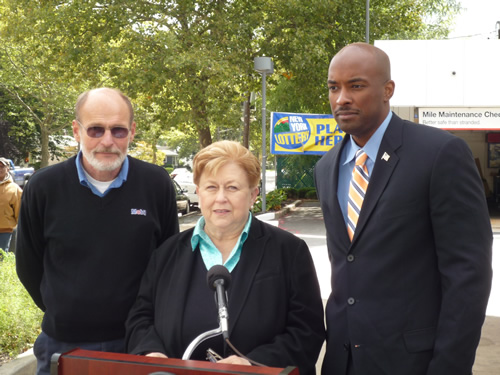Is it a wonderful day in your neighborhood for gas prices? Depends on where you live…
Nassau Legislators Jacobs & Abrhams alert consumers to GAS ZONE PRICING
Nassau County legislators Judy Jacobs (D-Woodbury) and Kevan Abrahams (D-Hempstead) today told consumers to be wary of zone pricing of gas, a practice used by big oil companies to artificially inflate the price of gas in certain regions if the companies think the neighborhood has deep pockets, resulting in higher prices often being charged in wealthy areas. It’s best illustrated by the higher gas prices drivers might see out in the Hamptons, with prices getting lower as they drive west or in the different prices charged in an area like Syosset versus Hicksville.
According to Deputy Presiding Officer Abrahams, a state law passed in November of 2008, called the Consumer Protection and Fair Equitable Motor Fuel Pricing Act, was aimed at protecting consumers from being charged more for gas based on the demographics of an area. But the law has fallen short because distributors and their affiliates are exempt.
“Zone pricing manipulates the market and is unfair to consumers,” said Abrahams. “State lawmakers need to amend the language of the law so that the statute can be more effective in its operation and enforcement.”
Although an amendment to the law passed in the State Assembly, the measure stalled in the State Senate, according to Abrahams. This amendment addressed the omission made in the original law.
“The Long Island Gasoline Retailers Association supports the efforts of Nassau County legislators Jacobs and Abrahams in bringing attention to the issue of zone pricing,” said Kathryn Odessa, the executive director of the Long Island Gasoline Retailers Association. She calls zone pricing “a discriminatory pricing policy.”
Legislator Jacobs stated: “The law is not working as it was intended to because we continue to see consumers forced to pay more for gas, depending on what neighborhood they live or work in. Consumers need to be aware of how zone pricing manipulates prices at the pump.”
Ms. Odessa continued: “Retailers have long fought to have the practice of zone pricing banned as it promotes discriminatory gasoline pricing practices and raises the cost of gasoline to consumers. In light of the current economy, consumers can’t afford to pay more and small businesses need to operate in a marketplace which enables healthy competition.”
How zone pricing works
?“Big Oil” uses a system of redlining called "zone pricing" for brand-name dealers.
?Typically, one person at each major oil company determines the wholesale price each dealer pays depending on the neighborhood or "zone" the dealer is located in.
?With zone pricing, the refinery charges different dealers different prices for its gasoline.
?The result is that the retailer has no ability to shop around for the cheapest gasoline. His prices are determined not by market forces, but by the refinery pricing manager. And until the refinery pricing manager decides to lower the wholesale price, the dealer's price will not go down no matter how abundant, or cheap, the supply of gasoline.
“This practice puts complete control of the retailer's profits in the hands of the refinery pricing manager,” said Abrahams, “and leaves the consumer a victim.”
“We hope that by shedding more light on the effects of zone pricing, we can encourage our State lawmakers to ban its use by all parties involved in the sale of gasoline,” Jacobs said. “Educating consumers about this issue is a good first step.”

Nassau County Legislator Judy Jacobs (center) and Deputy Presiding Officer of the Nassau County Legislature Kevan Abrahams (right)
alert consumers to be wary of zone pricing of gas, a practice used by big oil companies to artificially inflate the price of gas in certain regions.
Also attending the press conference was Peter Holmstedt (left)
of Tech Automotive and Tire and board member of the Long Island Gas Retailers Association.

